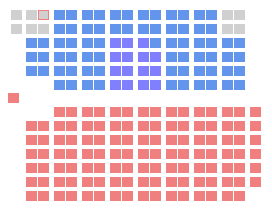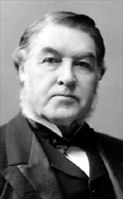Description
The governing Conservative Party, since the death of John A. Macdonald in 1891, was disorganized. Following Macdonald's death, John Abbott spent a year as Prime Minister before handing over to John Thompson. Thompson proved a relatively popular Prime Minister, but his sudden death in December 1894 resulted in his replacement by Mackenzie Bowell, whose tenure as Prime Minister proved a disaster. The Conservatives soon became viewed as corrupt and wasteful of public funds, partially due to the McGreecy-Langevin Scandal. Issues like the Manitoba Schools Question had cost the party support in both French and English Canada.

Sir John Alexander Macdonald was the first prime minister of Canada. The dominant figure of Canadian Confederation, he had a political career which spanned almost half a century.

Sir John Joseph Caldwell Abbott,, was a Canadian lawyer and politician, Freemason, who served as the third prime minister of Canada, in office from 1891 to 1892. He held office as the leader of the Conservative Party.

Sir John Sparrow David Thompson was a Canadian lawyer, judge, and politician who served as the fourth prime minister of Canada, in office from 1892 until his death. He had previously been premier of Nova Scotia for a brief period in 1882.
Though Bowell nominally remained Prime Minister until the election was called, leadership of the Conservative Party had been functionally taken over by Sir Charles Tupper, a Father of Confederation and former Premier of Nova Scotia. Earlier, in February 1896, Tupper introduced remedial legislation to settle the Manitoba dispute, but it was filibustered by an alliance of extreme Protestants led by Dalton McCarthy and the Liberals. This filibuster resulted in Tupper abandoning the bill and asking for a dissolution. Parliament was dissolved on April 24, 1896, and, in accordance with an agreement between Bowell and Tupper that the latter would become Prime Minister following the election call, he became prime minister on May 1, 1896, thus forming the 7th Canadian Ministry.

Sir Charles Tupper, 1st Baronet, was a Canadian father of Confederation: as the premier of Nova Scotia from 1864 to 1867, he led Nova Scotia into Confederation. He went on to serve as the sixth prime minister of Canada, sworn into office on May 1, 1896, seven days after parliament had been dissolved. He lost the June 23 election and resigned on July 8, 1896. His 69-day term as prime minister is currently the shortest in Canadian history.

Canadian Confederation was the process by which the British colonies of Canada, Nova Scotia, and New Brunswick were united into one Dominion of Canada on July 1, 1867. Upon confederation, the old province of Canada was divided into Ontario and Quebec; along with Nova Scotia and New Brunswick, the new federation thus comprised four provinces. Over the years since Confederation, Canada has seen numerous territorial changes and expansions, resulting in the current union of ten provinces and three territories.
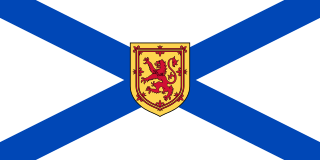
Nova Scotia is one of Canada's three Maritime Provinces, and one of the four provinces that form Atlantic Canada. Its provincial capital is Halifax. Nova Scotia is the second-smallest of Canada's ten provinces, with an area of 55,284 square kilometres (21,300 sq mi), including Cape Breton and another 3,800 coastal islands. As of 2016, the population was 923,598. Nova Scotia is Canada's second-most-densely populated province, after Prince Edward Island, with 17.4 inhabitants per square kilometre (45/sq mi).
Tupper argued that the real issue of the election was the future of Canadian industry, and he insisted that Conservatives needed to unite to defeat the Patrons of Industry. However, the Conservatives were so bitterly divided over the Manitoba Schools Question that wherever he spoke, he was faced with a barrage of criticism, most notably at a two-hour address he gave at Massey Hall in Toronto, which was constantly interrupted by the crowd.

The Patrons of Industry in Canada were based on the Patrons of Industry of Michigan that had formed in 1889. It was dedicated to upholding and encouraging the moral, social, intellectual, political and financial situation of farmers and to preserve the way of life that existed in farming communities in the late nineteenth century against encroaching industrialization. It cooperated with the urban labour movement to address the political frustrations of both groups with big business.

Massey Hall is a performing arts theatre in the Garden District of downtown Toronto, Ontario, Canada. The theatre was designed to seat 3,500 patrons, but after extensive renovations in the 1940s it now seats up to 2,765.

Toronto is the provincial capital of Ontario and the most populous city in Canada, with a population of 2,731,571 in 2016. Current to 2016, the Toronto census metropolitan area (CMA), of which the majority is within the Greater Toronto Area (GTA), held a population of 5,928,040, making it Canada's most populous CMA. Toronto is the anchor of an urban agglomeration, known as the Golden Horseshoe in Southern Ontario, located on the northwestern shore of Lake Ontario. A global city, Toronto is a centre of business, finance, arts, and culture, and is recognized as one of the most multicultural and cosmopolitan cities in the world.
The election saw a great change in the Liberal Party. While the Liberals had traditionally been the party for radical change and free trade, in the 1896 election, they embraced a much more conservative platform. That helped many of the traditional supporters of the Conservative Party move to the Liberals. The most important change was Laurier's support of the National Policy, an important cause to the powerful business interests of Montreal and Toronto. The Liberal campaign was directed by an ex-Conservative, Joseph Israël Tarte. Laurier was also a strong supporter of provincial rights, and a number of powerful Liberal premiers supported the campaign, such as Ontario's Oliver Mowat and Nova Scotia's W. S. Fielding, both of whom who won seats in the House and were appointed to cabinet after the election.

Free trade is a trade policy that does not restrict imports or exports; it is the idea of the free market as applied to international trade. In government, free trade is predominately advocated by political parties that hold liberal economic positions, while economically left-wing and nationalist political parties generally support protectionism, the opposite of free trade.

The National Policy was a Canadian economic program introduced by John Alexander Macdonald's Conservative Party in 1876 and put into action in 1879. It called for high tariffs on imported manufactured items to protect the manufacturing industry, the building of the Canadian Pacific Railway, and the fostering of new immigration to the west. Macdonald campaigned on the policy in the 1878 election, and defeated the Liberal Party, which supported free trade. It lasted from 1879 until sometime in early 1950s.
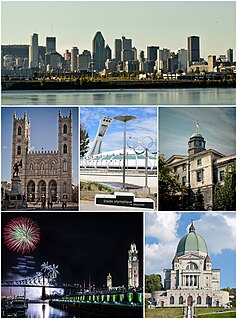
Montreal is the most populous municipality in the Canadian province of Quebec and the second-most populous municipality in Canada. Originally called Ville-Marie, or "City of Mary", it is named after Mount Royal, the triple-peaked hill in the heart of the city. The city is centred on the Island of Montreal, which took its name from the same source as the city, and a few much smaller peripheral islands, the largest of which is Île Bizard. It has a distinct four-season continental climate with warm to hot summers and cold, snowy winters.
Ending up, the Conservatives won the most votes in the 1896 election (46.5% of the votes, in comparison to 45% for the Liberals). However, they captured only about half of the seats in English Canada, but Laurier's Liberals won a landslide victory in Quebec, where Tupper's reputation as an ardent imperialist was a major handicap. Tupper's inability to persuade Joseph-Adolphe Chapleau to return to active politics, as his Quebec lieutenant, ended any chances of the Conservatives winning that province.

Sir Joseph-Adolphe Chapleau, born in Sainte-Thérèse, Quebec, was a French-Canadian lawyer and politician.
In Canadian politics, a Quebec lieutenant is a politician, from Quebec, usually a francophone and most often a Member of Parliament or at least a current or former candidate for Parliament, who is selected by a senior politician such as the Prime Minister or the leader of a national federal party, as his or her main advisor and/or spokesperson on issues specific to Quebec. This is particularly the case when the leader is an anglophone, though several francophone leaders have also had Quebec lieutenants; all francophone leaders of the Liberal Party have had Quebec lieutenants. This is usually a well-known but often an unofficial assignment. The position has no official legal status.
Although Laurier had clearly won the election on June 24, Tupper initially refused to cede power, insisting that Laurier would be unable to form a government even if the Liberal Party won 55% of the seats in the House of Commons. However, when Tupper attempted to make appointments as prime minister, Governor General Lord Aberdeen intervened, dismissing Tupper and inviting Laurier to form a government. Tupper maintained that Lord Aberdeen's actions were unconstitutional. The voter turnout was 72.9%

Sir Mackenzie Bowell was a Canadian newspaper publisher and politician, who served as the fifth prime minister of Canada, in office from 1894 to 1896.

Events from the year 1896 in Canada.

The Canadian federal election of 1867, held from August 7 to September 20, was the first election for the new nation of Canada. It was held to elect members to the House of Commons of Canada, representing electoral districts in the provinces of Nova Scotia, New Brunswick, Ontario and Quebec in the 1st Parliament of Canada. The provinces of Manitoba (1870) and British Columbia (1871) were created during the term of the 1st Parliament of Canada and were not part of the Canadian federal election of 1867.

The Canadian federal election of 1872 was held from July 20 to October 12, 1872, to elect members of the House of Commons of Canada of the 2nd Parliament of Canada. Prime Minister Sir John A. Macdonald's Conservative Party remained in power, defeating the Liberals. However, the Liberals increased their parliamentary representation considerably, while the Conservative seat count remained static, giving them only five more seats than the Liberals. This technically resulted in the country's first minority government, though the support of two independent Conservative MPs functionally gave Macdonald an extremely slim majority.

Sir Hugh John Macdonald, was the only surviving son of the first Prime Minister of Canada, Sir John A. Macdonald. He too was a politician, serving as a member of the House of Commons of Canada and a federal cabinet minister, and briefly as the eighth Premier of Manitoba.

The Canadian federal election of 1891 was held on March 5 to elect members of the House of Commons of Canada of the 7th Parliament of Canada. It was won by the Conservative Party of Prime Minister Sir John A. Macdonald.

Robert Rogers, was a Canadian merchant and politician. He served as a cabinet minister at the federal and provincial levels.

Thomas Greenway was a Canadian politician, merchant and farmer. He served as the seventh Premier of Manitoba from 1888 to 1900. A Liberal, his ministry formally ended Manitoba's non-partisan government, although a de facto two-party system had existed for some years.

Sir Charles Hibbert Tupper was a Canadian lawyer and politician.
Joseph-Aldric Ouimet, was a Canadian parliamentarian.

The 1917 Canadian federal election was held on December 17, 1917, to elect members of the House of Commons of Canada of the 13th Parliament of Canada. Described by historian Michael Bliss as the "most bitter election in Canadian history", it was fought mainly over the issue of conscription. The election resulted in Prime Minister Sir Robert Borden's Unionist government elected with a strong majority and the largest percentage of the popular vote for any party in Canadian history.

The Canadian federal election of 1878 was held on September 17 to elect members of the House of Commons of Canada of the 4th Parliament of Canada. It resulted in the end of Prime Minister Alexander Mackenzie's Liberal government after only one term in office. Canada suffered an economic depression during Mackenzie's term, and his party was punished by the voters for it. The Liberals' policy of free trade also hurt their support with the business establishment in Toronto and Montreal.

The Canadian federal election of 1882 was held on June 20, 1882, to elect members of the House of Commons of Canada of the 5th Parliament of Canada.

The Canadian federal election of 1887 was held on February 22, 1887, to elect members of the House of Commons of Canada of the 6th Parliament of Canada.
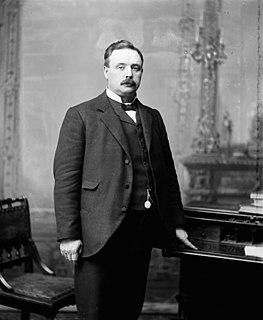
Walter Humphries Montague, was a Canadian politician. He was a federal cabinet minister in the governments of Mackenzie Bowell and Charles Tupper, and subsequently a provincial cabinet minister in the Manitoba government of Rodmond Roblin. Montague was a member of the Conservative Party of Canada.
This article covers the history of the Liberal Party of Canada.

This article is the Electoral history of Sir Mackenzie Bowell, the fifth Prime Minister of Canada. A Conservative, he became prime minister upon the sudden death in office of Prime Minister Sir John Thompson in 1894. Bowell served a short term of just over one year as prime minister (1894-1896), until he was forced to resign over the Manitoba Schools Question. He never led his party in a general election. When he died in 1917, he was one of the last surviving members of the first House of Commons of Canada elected in 1867.

This article is the Electoral history of Sir Charles Tupper, the sixthth Prime Minister of Canada. A Conservative, he became prime minister upon the resignation of Prime Minister Sir Mackenzie Bowell over the Manitoba Schools Question in 1896. Tupper was the shortest-serving prime minister, with a term of only 68 days. He led his party in two general elections and lost both, to Sir Wilfrid Laurier

This article is the Electoral history of Sir Wilfrid Laurier, the seventh Prime Minister of Canada.

